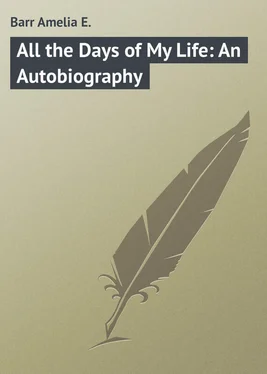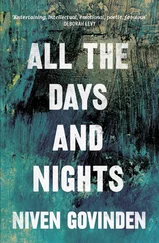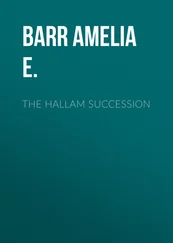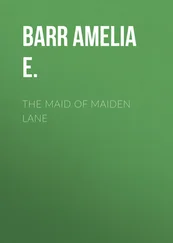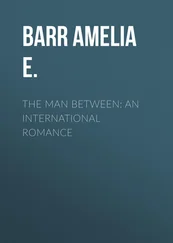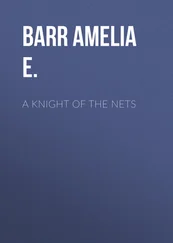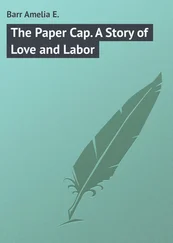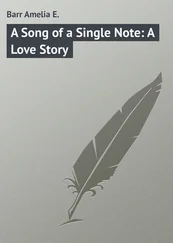Amelia Barr - All the Days of My Life - An Autobiography
Здесь есть возможность читать онлайн «Amelia Barr - All the Days of My Life - An Autobiography» — ознакомительный отрывок электронной книги совершенно бесплатно, а после прочтения отрывка купить полную версию. В некоторых случаях можно слушать аудио, скачать через торрент в формате fb2 и присутствует краткое содержание. Жанр: foreign_prose, foreign_language, на английском языке. Описание произведения, (предисловие) а так же отзывы посетителей доступны на портале библиотеки ЛибКат.
- Название:All the Days of My Life: An Autobiography
- Автор:
- Жанр:
- Год:неизвестен
- ISBN:нет данных
- Рейтинг книги:5 / 5. Голосов: 1
-
Избранное:Добавить в избранное
- Отзывы:
-
Ваша оценка:
- 100
- 1
- 2
- 3
- 4
- 5
All the Days of My Life: An Autobiography: краткое содержание, описание и аннотация
Предлагаем к чтению аннотацию, описание, краткое содержание или предисловие (зависит от того, что написал сам автор книги «All the Days of My Life: An Autobiography»). Если вы не нашли необходимую информацию о книге — напишите в комментариях, мы постараемся отыскать её.
All the Days of My Life: An Autobiography — читать онлайн ознакомительный отрывок
Ниже представлен текст книги, разбитый по страницам. Система сохранения места последней прочитанной страницы, позволяет с удобством читать онлайн бесплатно книгу «All the Days of My Life: An Autobiography», без необходимости каждый раз заново искать на чём Вы остановились. Поставьте закладку, и сможете в любой момент перейти на страницу, на которой закончили чтение.
Интервал:
Закладка:
And in Penrith I began a new set of books which charmed me quite as much as “Robinson Crusoe” and the “Arabian Nights” had done. On my seventh birthday my father gave me Cook’s “Voyages Round the World,” and this volume was followed by Anson’s “Voyage,” by Mungo Park’s “Travels in Africa,” and Bruce’s “Travels in Abyssinia.” Twenty-two years ago I stood one afternoon at the grave of Bruce in a lonely kirk yard a few miles outside Glasgow. It was a neglected mound with the stone slanting down above it. I remembered then, as I do now, how severely his book had been criticized and even discredited. But later travellers substantiated all that Bruce had said and added to his recital still more unlikely stories.
There was also another book which at this time thrilled and charmed me beyond expression. I doubt if there is a single copy of it in America, and not many in England, such as remain I dare say being hid away in the old libraries of ancient farm or manor houses. It was called “News From the Invisible World,” by John Wesley. It was really a book of ghostly visitations and wonderful visions. My father took it out of my hands twice and then put it, as he supposed, out of my reach; but by putting a stool upon a chair, and climbing upon the chair and then upon the stool I managed to reach it. I can see myself today in a little gingham frock, and a white pinafore performing this rather dangerous feat. We were dressed very early in the morning, but never so early as not to find a good fire in the study; and the coal used in the north of England, is that blessed soft material, which gives in its bright manifold blazes, the light of half a dozen candles. Lying face downward upon the hearthrug, I could read with the greatest ease, and often spent an hour in “the invisible world” very much to my liking before the day really began.
One morning while thus engaged, Ann Oddy came in and I asked her to put the book back in its place. She looked at me suspiciously, and said, “Who put it up there?”
“My father,” I answered.
“What for?” she continued.
“Because it is about ghosts, Ann, and such stories as you often tell me. Put it up or Father will be cross with me.”
“Well, Amelia,” she said in a kind of dreamy way, “your father ought to know, but he isn’t a bit well lately, so I won’t bother him at this time.”
Then I promised to tell her the stories, and added, “They are all true, Ann, for John Wesley wrote them.”
“True!” she ejaculated. “Well, well, I am astonished at Mr. Huddleston’s putting anything John Wesley wrote out of the way. I am that.” About A.D. 1890 I asked a learned doctor connected with the Methodist Book Concern, if they had a copy of it, and he answered very sharply, “I never heard of the book.” Yet I know it existed in my childhood, and that during my seventh and eighth years, I read it frequently.
The first year of my life in Penrith went happily onward in the regularity of its duties and pleasures. At home I remember but few changes. Soon after the Queen’s coronation, I had another brother, who was called William Henry, and when he was about two months old, my father went to Manchester, and brought back with him the greatest of household comforts of that day – a dozen boxes of Congreve or Lucifer matches. Only those who have stood shivering over the old tinder box on a bitter winter night, trying to get a spark while the baby screamed in the darkness, can form any estimate of the pleasure which these few boxes of matches made in our house. My father took us all into a dark room, and then permitted each person to strike a light. Laughter and exclamations of wonder and pleasure greeted every fresh match as it burst into instantaneous flame, even Ann was enthusiastic. “This time,” she admitted, “Mr. Huddleston has brought home something sensible and good for everybody” – a covert slur upon Father’s gifts, which usually took the form of books, or a bit of spar for the parlor chimney piece, or perhaps a likeness of Mr. Wordsworth, or a view of Derwentwater. We had both read and heard wonderful things of these matches for nearly three years, but the first put upon the market were intended only for the rich; for they were in more or less costly caskets, the cheapest of which was sold for a guinea. In a short time a phial full of matches were sold for five shillings, and when my father bought our first “light boxes” they were a shilling each. Then came the practical chemist and the factory system, and the penny box of matches was in every home. Yet I have no doubt that in many a home in England the empty five shilling box is affectionately preserved; for during their vogue, they were sensible and highly prized wedding gifts, among a large class of respectable people of limited means.
At the beginning of my second school year, I was promoted to a copy book. I could write pretty well with wad, and did not very often spoil a goose quill. That first copy book! Never shall I forget it. Its cover was canary color, and on the front was a picture of a negro. He was loaded with chains and hoeing cotton, while a white man stood over him using an impossible whip, and there were four lines by Cowper underneath the two figures:
“I would not have a slave to till my ground,
To carry me, to fan me while I sleep,
And tremble when I wake, for all the wealth
That sinews bought and sold, have ever earned.”
At that time I had never seen a negro, and my sense of amazement, fright and repugnance was so great, that I feel sure I had not even seen the picture of one. The tremendous excitement attending the enfranchisement of the slaves belonging to England was over before I was two years old, and after it, I think the nation must have repented their extravagant sympathy, for I am sure that at this time I had never heard either my father or any one else allude to the event.
Miss Pearson laid the book on my desk with evident pleasure, and I looked at the picture, covered my eyes with my hands, and burst into tears. I was never a crying child, and my teacher was astonished, and asked me rather sternly, “What is the matter with you, Amelia? Are you sick?”
“No,” I whispered. “I am afraid. Take it away.”
“Afraid?”
“I have not been bad,” I continued. “I do not like that picture. Please take it away.”
Then she sat down by my side and told me a story about the black man, and what England had just done for him. I hardly heard or understood her, until she said, “I shall leave the book with you. You must look at the picture every day until you at least feel pity for the slave. See, this is your copy for today. Let me see how cleanly, and well you can do it.”
I had ceased crying. I was ashamed of my own emotion, and I went courageously to work with a quill pen of my own cutting; but as soon as I returned home, I went to my mother and told her all. She soothed and petted me, but advised me to make no remarks about the picture. “There has been a deal of hard feeling about the negro, Milly, and we find it best to let that subject alone. No one talks of it now. Lucy Lowthian was here this morning. She is going to have a party on Saturday afternoon.”
“Are we going to it, Mother?”
“Yes,” she answered cheerily. “Look at this lace and white satin ribbon. I am going to trim your dresses with it.”
I instantly turned to the more personal and interesting subject, but I could not forget, nor yet have I ever forgotten that picture on my first copy book. Undoubtedly it was an exaggeration of even the Congo type, but why did I cry at the sight of it? I was neither a fearful nor a crying child. Why did I cry? It puzzled me then, but I know now, that there was undoubtedly some sudden soul shock, some prophetic apprehension, which my inner woman trembled before, and which my physical woman could only interpret by tears.
Читать дальшеИнтервал:
Закладка:
Похожие книги на «All the Days of My Life: An Autobiography»
Представляем Вашему вниманию похожие книги на «All the Days of My Life: An Autobiography» списком для выбора. Мы отобрали схожую по названию и смыслу литературу в надежде предоставить читателям больше вариантов отыскать новые, интересные, ещё непрочитанные произведения.
Обсуждение, отзывы о книге «All the Days of My Life: An Autobiography» и просто собственные мнения читателей. Оставьте ваши комментарии, напишите, что Вы думаете о произведении, его смысле или главных героях. Укажите что конкретно понравилось, а что нет, и почему Вы так считаете.
